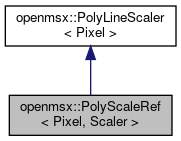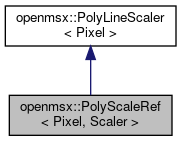Like PolyScale above, but instead keeps a reference to the actual scaler. More...
#include <LineScalers.hh>


Public Member Functions | |
| PolyScaleRef (Scaler &scaler_) | |
| void | operator() (std::span< const Pixel > in, std::span< Pixel > out) override |
| Actually scale a line. More... | |
| bool | isCopy () const override |
| Is this scale operation actually a copy? This info can be used to (in a multi-step scale operation) immediately produce the output of the previous step in this step's output buffer, so effectively skipping this step. More... | |
| virtual void | operator() (std::span< const Pixel > in, std::span< Pixel > out)=0 |
| Actually scale a line. More... | |
| virtual bool | isCopy () const =0 |
| Is this scale operation actually a copy? This info can be used to (in a multi-step scale operation) immediately produce the output of the previous step in this step's output buffer, so effectively skipping this step. More... | |
Additional Inherited Members | |
 Protected Member Functions inherited from openmsx::PolyLineScaler< Pixel > Protected Member Functions inherited from openmsx::PolyLineScaler< Pixel > | |
| ~PolyLineScaler ()=default | |
Detailed Description
class openmsx::PolyScaleRef< Pixel, Scaler >
Like PolyScale above, but instead keeps a reference to the actual scaler.
Can be used when the actual scaler is expensive to construct (e.g. Blur_1on3).
Definition at line 339 of file LineScalers.hh.
Constructor & Destructor Documentation
◆ PolyScaleRef()
|
inlineexplicit |
Definition at line 342 of file LineScalers.hh.
Member Function Documentation
◆ isCopy()
|
inlineoverridevirtual |
Is this scale operation actually a copy? This info can be used to (in a multi-step scale operation) immediately produce the output of the previous step in this step's output buffer, so effectively skipping this step.
Implements openmsx::PolyLineScaler< Pixel >.
Definition at line 350 of file LineScalers.hh.
◆ operator()()
|
inlineoverridevirtual |
Actually scale a line.
- Parameters
-
in Buffer containing input line. out Buffer that should be filled with output. Note: The relative size of the input and output depends on the actual scaler. For example Scale_2on1 requires twice as many pixels in the input than in the output.
Implements openmsx::PolyLineScaler< Pixel >.
Definition at line 346 of file LineScalers.hh.
The documentation for this class was generated from the following file: